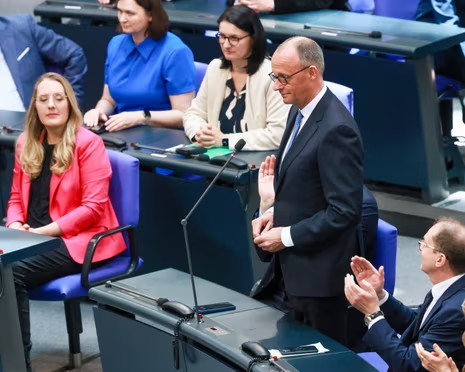Germany’s Friedrich Merz has formally been elected Chancellor at the second attempt, hours after an unprecedented loss in the first round of voting that raised troubling doubts about the stability of the next coalition government.
In a hastily organized session on Tuesday afternoon, 325 lawmakers voted to approve his appointment — more than the 316 he required.
Earlier in the day 18 unnamed rebels from the newly formed alliance between his conservatives and the Social Democrats had voted to deprive him of the required majority in the secret ballot.
A visibly relieved Merz told the Bundestag President, Julia Klöckner, after she announced the result, “Madam Speaker, thank you for the trust,” adding, “I accept the election.”

His appointment was approved by the President shortly later, and he is set to be sworn in at the Bundestag.
Merz, who won an election in February and unveiled a ruling coalition last month, had fallen six votes short earlier in the day, a stunning setback that marked another twist in a tortuous period of uncertainty for the country.
He is now set to formally become Chancellor after being approved by the German President.
Merz’s Christian Democratic Union (CDU) party won an election in February, but failed to pick up enough seats to govern outright – an outcome that is commonplace in Germany’s diverse political environment.
He last month announced he would form a coalition with the center-left Social Democrats (SPD), a rare fusing of Germany’s two establishment groups that ensured the AfD – which came second in the February poll – would remain locked out of power.
It extended the so-called “firewall,” a blockade against far-right groups that German politicians have kept in place since after World War II, but which has become increasingly tenuous.
Despite leading his party to victory in February, Merz has a deep popularity deficit among Germans, who mistrust his often brash style and mercurial temperament.
A poll last week for the public broadcaster ZDF showed that only 38% supported him as Chancellor while 56% said he was the wrong person for the job.
Merz is particularly disliked by Social Democrats, with 62% rejecting him, in a gloomy foreshadowing of Tuesday’s disaster.
Merz’ Tenure Starts On Unstable Footing

The shaky start to Merz’s four-year term points to potential divisions in the coalition’s ranks just as he is facing an already staggering in-tray of domestic and foreign policy challenges unseen since national reunification 35 years ago.
His tenure will start on unstable footing: Tuesday’s votes revealed reluctance inside his coalition, and gave the insurgent far-right AfD party a new opportunity to ruffle the political establishment.
The coalition has 328 seats in total, and the vote to approve a chancellor is usually a formality; never before in modern German history had a Chancellor-in-waiting failed to win. But on Tuesday, on what was set to be a day of celebration, Merz’s future was briefly plunged into uncertainty.
His defeat, which had been entirely unexpected, came after weeks of attacks against his bloc from the insurgent far-right AfD party and from the increasingly intrusive Trump administration. And it exposed the early cracks within a marriage of convenience between the CDU and the SPD.
Because the vote was held by secret ballot, it was not immediately clear – and might never be known – who had defected from Merz’s camp.
Merz will also have to deal with disruption from the far-right AfD, which came second in February’s election and is now topping some opinion polls.
The group quickly pounced on the parliamentary uncertainty on Tuesday morning, calling for fresh elections.
The incoming government will have to revive the flatlining economy and fend off the far right while maintaining support for Ukraine against the backdrop of fresh uncertainty in the transatlantic relationship under Donald Trump.
READ ALSO: Benso Oil Palm to Pay GHS0.09 Dividend on July 10, 2025, Pending Shareholder Nod























